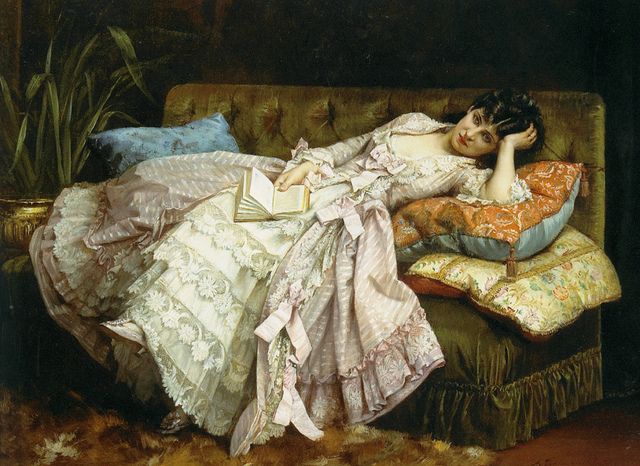
Auguste Toulmouche, Dolce Far Niente, 1877
The Keats-Shelley Synchronised Reading Group meets once a week - alone and together - to read a poem, prose passage or even the back of a cereal box. The idea was sparked by John Keats himself, who in December 1818 wrote from London to his brother George and Georgiana Keats in Kentucky:
‘I shall read a passage of Shakespeare every Sunday at ten oClock – you read one at the same time and we shall be as near each other as blind bodies can be in the same room.’
Our sixth meeting begins at 2pm GMT on Wedneday 6th May, when we will read John Keats' Ode on Indolence - to mark the burst of inspiration 201 years ago that resulted in his sequence of great odes - Indolence, Melancholy, Psyche, Nightingale and Grecian Urn. Scroll down to read the text.
If work, family or time zones make this difficult - John and George would have been four hours apart - read at your own 12 noon. Or whenever you can - the important part is the reading. No Zoom, no Google Hangout, no Skype. Just reading and perhaps the thought of others reading along with us.
We would love to hear where in the world you are reading. If you want to send us a video or recording of your reading - or your thoughts and feelings - please do so. Get in touch on Twitter or Facebook. You can email us too: ksmafriends@hotmail.com.

John William Godward, Dolce Far Niente (Sweet Idleness) (or A Pompeian Fishpond), 1904
Ode on Indolence by John Keats
‘They toil not, neither do they spin.’
One morn before me were three figures seen,
With bowèd necks, and joinèd hands, side-faced;
And one behind the other stepp’d serene,
In placid sandals, and in white robes graced;
They pass’d, like figures on a marble urn,
When shifted round to see the other side;
They came again; as when the urn once more
Is shifted round, the first seen shades return;
And they were strange to me, as may betide
With vases, to one deep in Phidian lore.
How is it, Shadows! that I knew ye not?
How came ye muffled in so hush a mask?
Was it a silent deep-disguisèd plot
To steal away, and leave without a task
My idle days? Ripe was the drowsy hour;
The blissful cloud of summer-indolence
Benumb’d my eyes; my pulse grew less and less;
Pain had no sting, and pleasure’s wreath no flower:
O, why did ye not melt, and leave my sense
Unhaunted quite of all but—nothingness?
A third time pass’d they by, and, passing, turn’d
Each one the face a moment whiles to me;
Then faded, and to follow them I burn’d
And ached for wings, because I knew the three;
The first was a fair Maid, and Love her name;
The second was Ambition, pale of cheek,
And ever watchful with fatiguèd eye;
The last, whom I love more, the more of blame
Is heap’d upon her, maiden most unmeek,—
I knew to be my demon Poesy.
They faded, and, forsooth! I wanted wings:
O folly! What is Love? and where is it?
And for that poor Ambition! it springs
From a man’s little heart’s short fever-fit;
For Poesy!—no,—she has not a joy,—
At least for me,—so sweet as drowsy noons,
And evenings steep’d in honey’d indolence;
O, for an age so shelter’d from annoy,
That I may never know how change the moons,
Or hear the voice of busy common-sense!
And once more came they by:—alas! wherefore?
My sleep had been embroider’d with dim dreams;
My soul had been a lawn besprinkled o’er
With flowers, and stirring shades, and baffled beams:
The morn was clouded, but no shower fell,
Tho’ in her lids hung the sweet tears of May;
The open casement press’d a new-leaved vine,
Let in the budding warmth and throstle’s lay;
O Shadows! ’twas a time to bid farewell!
Upon your skirts had fallen no tears of mine.
So, ye three Ghosts, adieu! Ye cannot raise
My head cool-bedded in the flowery grass;
For I would not be dieted with praise,
A pet-lamb in a sentimental farce!
Fade softly from my eyes, and be once more
In masque-like figures on the dreamy urn;
Farewell! I yet have visions for the night,
And for the day faint visions there is store;
Vanish, ye Phantoms! from my idle spright,
Into the clouds, and never more return!
James Kidd